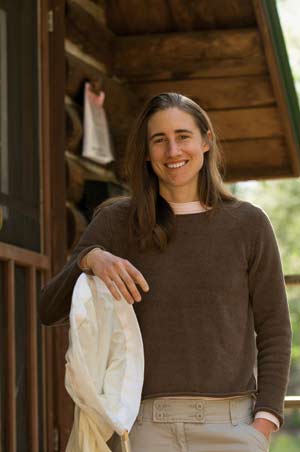
Photo by Bill Denison
Evelyn Fetridge talks as easily about the collapse of bee colonies and endosymbiotic bacteria as she does about a recent lunch at Arthur Avenue’s Trattoria Zero Otto Nove. Her causal demeanor, however, belies a serious mind and ambitious spirit.
She is, after all, a Clare Boothe Luce Fellow and a rising star within the Graduate School of Arts and Sciences (GSAS).
According to Fetridge, the decision to pursue her master’s degree in biological sciences at Fordham boiled down to two factors: the chance to study with renowned insect ecologist Gail Langellotto, Ph.D., and the University’s Calder Center, a 113-acre biological field station in Armonk, N.Y., which Fetridge calls “a nice incubator” for ecological research and environmental education.
Under Langellotto—and, later, with Gordon R. Plague, Ph.D., an assistant professor of evolutionary biology—Fetridge studied the community dynamics of bees in suburban ecosystems and quickly made a name for herself within the department.
She won Fordham’s Matteo Ricci Summer Fellowship and received the Clare Boothe Luce Fellowship, a two-year prize for outstanding women pursuing graduate degrees in biological sciences.
In 2006, Fetridge traveled to Curitiba, Brazil, to take part in the United Nations Development Programme’s (UNDP) equator initiative, an international partnership designed to facilitate sustainable communities in developing countries within the equatorial belt.
Fetridge credits Fordham, which is working with UNDP, for giving her the experience of rallying international organizations and groups behind a common cause.
“The trip was invaluable,” she said. “Not only did I get to experience a new country, I also gained insight into the U.N.’s processes and what it is doing to look after the environment.”
With her requirements for a coursework master’s degree now complete, Fetridge is gearing up for her doctoral work. She plans on studying endosymbiotic bacteria—unique organisms that live within another organism and are capable of rearranging their DNA sequences.
Fetridge wants to determine the effects of this genome rearrangement on the fitness and evolution of host organisms, specifically the aphid—a small, plant-eating insect. She hopes to find out whether or not genome rearrangement helps organisms adapt quicker to different circumstances or if endosymbiotic bacteria is primarily parasitic in nature.
She is currently a teacher’s assistant with J. Alan Clark, Ph.D., shouldering a good chunk of the teaching duties for his prerequisite lab course in biological concepts. She said she’s taken to teaching at a collegiate level. “I enjoy making difficult concepts clear,” she said. “Plus, it’s nice to interact with people.”
This interaction, according to Fetridge, is a welcome reprieve as she gets deeper into her doctoral research and work. She spends most of her days in a cubical preparing her master’s thesis for publication. This summer, she plans on beginning her field research in earnest.
In the meantime, she’s in no hurry to decide her future away from Fordham’s GSAS and Calder Center. Her experiences at the University already have given her a good sense of what lies ahead, she said.
“I’ll probably keep doing what I’ve been doing,” she said of her impressive tenure at Fordham. “And let that lead me to the right place.”
